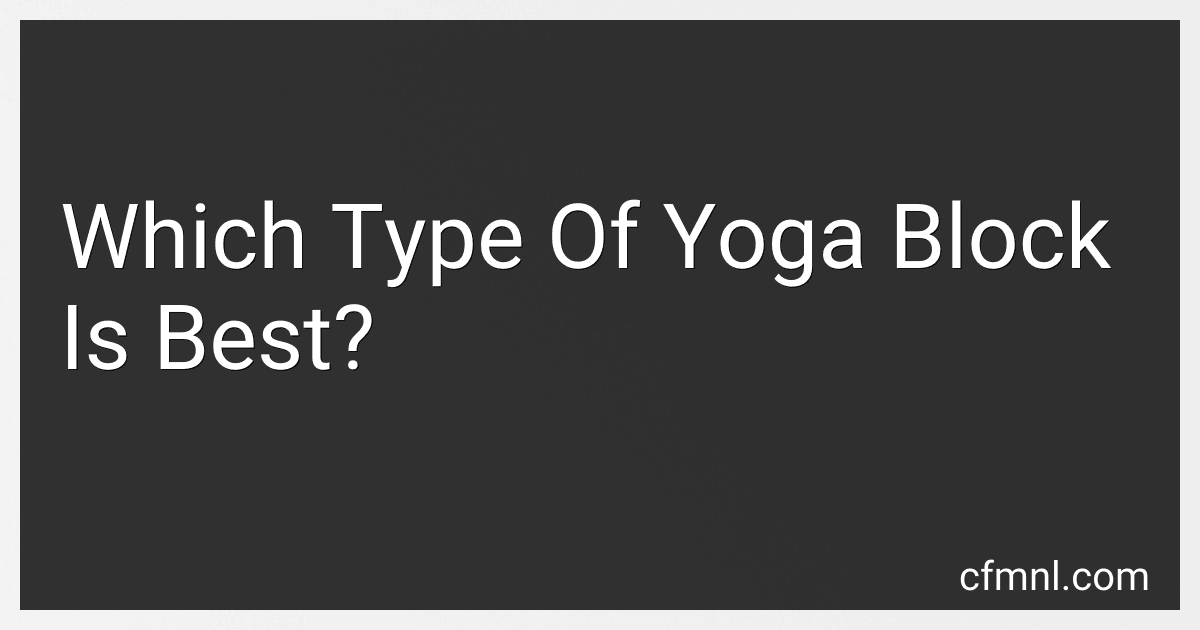Best Yoga Blocks to Buy in February 2026
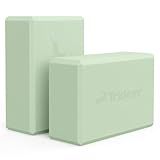
Trideer Yoga Block, Soft Non-Slip Surface Premium Foam Blocks, Supportive, Lightweight, Odorless, Yoga Accessories for Pilates Meditation General Fitness Stretching Toning (Mint Green-2 Pack)
- ENHANCE COMFORT AND STABILITY IN EVERY YOGA SESSION WITH TRIDEER.
- MINIMIZE INJURY RISK AND MAINTAIN PROPER ALIGNMENT DURING POSES.
- VERSATILE, LIGHTWEIGHT, AND ECO-FRIENDLY - PERFECT FOR ALL YOGIS!


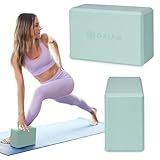
Gaiam Yoga Block - Supportive Latex-Free Eva Foam - Soft Non-Slip Surface with Beveled Edges for Yoga, Pilates, Meditation - Yoga Accessories for Stability, Balance, Deepen Stretches
- ACHIEVE OPTIMAL ALIGNMENT FOR DEEPER POSES AND IMPROVED STABILITY.
- LIGHTWEIGHT & DURABLE DESIGN, PERFECT FOR HOME OR CLASS USE.
- NON-SLIP SURFACE ENSURES A SECURE GRIP FOR ALL YOGA PRACTICES.


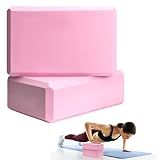
2 Pcs Yoga Blocks, 9"x6"x3" Foam Blocks Yoga Props for Pilates Stretching and Meditation Exercise Blocks Lightweight Yoga Essentials (Pink, normal)
- ENHANCE POSES: IMPROVE PRECISION AND EASE WITH SUPPORTIVE YOGA BLOCKS.
- DURABLE DESIGN: WATER-RESISTANT EVA RUBBER FOR LONG-LASTING USE.
- EASY TO CARRY: LIGHTWEIGHT AND COMPACT FOR ON-THE-GO YOGA SESSIONS.


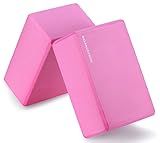
Fitvids Set of 2 High Density Yoga Blocks, 9"x6"x4" Each, Pair (Pink)
- HIGH-DENSITY FOAM: DURABLE, LIGHTWEIGHT, AND EASY TO CLEAN!
- SLIP-RESISTANT DESIGN ENSURES STABILITY AND COMFORT DURING USE.
- PERFECT FOR ALL FITNESS LEVELS-ENHANCE STRETCHES AND POSTURE!


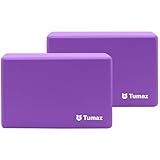
Tumaz Non-Slip Yoga Blocks 2-Pack - High Density/Lightweight EVA Foam & Natural Cork for Stability, Premium Set with E-Book Included
- PREMIUM FOAM ENSURES MAXIMUM SUPPORT AND COMFORT IN EVERY POSE.
- VERSATILE DESIGN ENHANCES STABILITY FOR ALL YOGA LEVELS AND STYLES.
- PERFECT FOR IMPROVING FLEXIBILITY AND ALIGNMENT IN YOUR PRACTICE.


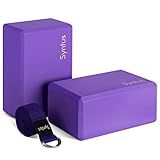
Syntus Yoga Block and Strap Set, 2 EVA Foam Soft Non-Slip Blocks 9×6×4 inches, 8FT Metal D-Ring Strap for Yoga, General Fitness, Pilates, Stretching and Toning
- ECO-FRIENDLY EVA FOAM FOR SAFE, DURABLE, AND LONG-LASTING USE.
- 8FT YOGA STRAP WITH D-RING ENHANCES FLEXIBILITY AND MUSCLE RECOVERY.
- EASY MAINTENANCE: SIMPLY SPOT CLEAN FOR A FRESH, READY-TO-USE SET.


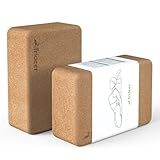
Trideer Cork Yoga Blocks, 2 Pack Natural Cork Blocks, High Density with Non Slip Surface, Eco-Friendly Accessories and Ideal for Yoga, Pilates, Stretching
-
ECO-FRIENDLY: SUSTAINABLY SOURCED CORK, SAFE FOR FAMILY & PLANET.
-
SUPERIOR STABILITY: HIGH-DENSITY DESIGN ENSURES SAFE, NON-SLIP PRACTICES.
-
VERSATILE USE: IDEAL FOR YOGA, MEDITATION, AND VARIOUS FITNESS WORKOUTS.


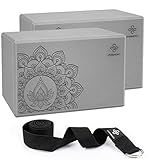
Overmont Yoga Block 2 Pack Supportive Latex-Free EVA Foam Soft Non-Slip Surface for General Fitness Pilates Stretching and Meditation 9"x6"x3" Yoga Strap Included
-
LIGHTWEIGHT & PORTABLE: EASY TO CARRY FOR YOGA AT HOME OR ON-THE-GO.
-
ENHANCED STABILITY: HIGH-DENSITY EVA-FOAM OFFERS FIRM SUPPORT AND COMFORT.
-
VERSATILE USE: IDEAL FOR BEGINNERS AND PROS TO MODIFY AND ALIGN POSES.


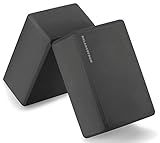
Fitvids Set of 2 High Density Yoga Blocks, 9"x6"x4" Each, Pair (Black)
- ENHANCE YOUR WORKOUTS WITH HIGH-DENSITY, SLIP-RESISTANT YOGA BLOCKS.
- PERFECT FOR ALL FITNESS LEVELS-IMPROVE YOUR STRETCHES AND POSTURE!
- DURABLE, EASY-TO-CLEAN FOAM BLOCKS FOR HOME, GYM, OR STUDIO USE.


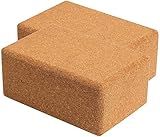
Cork Yoga Blocks 2 Pack Set -Natural Cork from Portugal, 9"x6"x4" Yoga Blocks Non-Slip&Anti-Tilt for Women| Men, Lightweight, Odor-Resistant| Moisture-Proof, Perfect Yoga Equipment
- ECO-FRIENDLY CORK FROM PORTUGAL: DURABLE, ODOR-RESISTANT, EASY TO CLEAN.
- NON-SLIP GRIP DESIGN: ENSURES SAFETY AND CONTROL FOR ALL SKILL LEVELS.
- SATISFACTION GUARANTEE: 180-DAY REFUND POLICY FOR WORRY-FREE SHOPPING.


When it comes to yoga blocks, choosing the right type can greatly enhance your yoga practice. There are various types of yoga blocks available on the market, each offering different materials and benefits. Here are some popular options and their features:
- Foam Blocks: Foam yoga blocks are lightweight and affordable, making them a popular choice for beginners. They provide a comfortable and soft surface for support, making them suitable for those with sensitive joints. Foam blocks are also easy to clean and maintain.
- Cork Blocks: Cork yoga blocks are made from sustainable materials and offer excellent durability. They provide a firm and stable surface, making them ideal for advanced yogis or people with more experience in their practice. Cork blocks have a natural grip, making them less likely to slip during challenging poses.
- Bamboo Blocks: Bamboo yoga blocks are known for their eco-friendly nature. They provide a firm and sturdy surface and are a great option for those who prefer a more solid feel. Bamboo blocks are also lighter than cork blocks and offer a natural aesthetic appeal.
- Wooden Blocks: Wooden yoga blocks are often made from sturdy, sustainable materials and provide good durability. They offer a solid and stable surface and can be an aesthetically pleasing addition to your yoga practice. However, wooden blocks tend to be heavier compared to other options.
Ultimately, the best type of yoga block for you depends on your personal preference, level of experience, and the type of support you need. Consider factors such as comfort, grip, durability, eco-friendliness, and budget when selecting the ideal yoga block for your practice.
How to choose the best yoga block?
- Material: Look for blocks made of high-density foam, cork, or bamboo. Foam blocks are affordable and lightweight, while cork and bamboo blocks offer more durability and stability.
- Size: Consider your body type and flexibility. Most standard blocks are 9 inches by 6 inches by 4 inches, but there are also larger and smaller sizes available. Taller individuals may prefer larger blocks, while smaller individuals or those with limited flexibility may find smaller blocks more comfortable.
- Density: Different blocks have varying densities, affecting their firmness and stability. If you need more support or are a beginner, opt for a softer block. If you prefer a more challenging and stable practice, choose a firmer block.
- Weight: Depending on your needs, consider the weight of the block. Lightweight blocks are easier to carry, making them ideal for traveling or practicing outside. Heavier blocks can provide more stability but may be cumbersome to transport.
- Sustainability: If you value eco-friendly options, look for blocks made from sustainable materials such as cork or bamboo. These materials are renewable and have a lower environmental impact compared to foam blocks made from synthetic materials.
- Price: Consider your budget and prioritize quality over price. While foam blocks are generally more affordable, they may wear down over time. Cork and bamboo blocks tend to be more expensive but offer better durability and longevity.
- Testing: If possible, visit a yoga studio or a store that sells yoga props to try different blocks and see what feels most comfortable and suitable for your practice. Testing different blocks will give you a better idea of which one fits your needs and preferences.
Remember that everyone's needs and preferences are different, so what works for someone else may not work for you. It's important to find a yoga block that supports your practice and enhances your experience.
How to determine the right size of a yoga block?
To determine the right size of a yoga block, consider the following factors:
- Height and flexibility level: Your height and flexibility level will influence the size of the yoga block you need. Taller individuals may require a larger block to accommodate their longer limbs, while those with less flexibility may find a larger block helpful for additional support.
- Personal preference: Some people prefer a larger block for added stability and support, while others may find a smaller block more comfortable to work with. Experiment with different sizes to find what works best for you.
- Intended use: Determine the specific use of the block. If you primarily use it for restorative or gentle yoga practices, a larger block may offer more comfort and support. If you plan to use the block for more challenging poses or to deepen stretches, a smaller block may provide more versatility.
- Grip and stability: Consider the material and texture of the block. Choose a block that provides enough grip and stability to support your practice. Softer foam blocks often offer more comfort, while cork or wooden blocks may provide better traction.
Ultimately, the right size of a yoga block varies from person to person, depending on individual needs and preferences. It may be helpful to try out different sizes and shapes to discover the perfect fit for your practice.
What is the recommended firmness for a yoga block?
The recommended firmness for a yoga block is typically medium or firm. A medium-firm block provides a balance between stability and comfort, allowing you to feel supported while still being able to maintain proper alignment during yoga poses. However, some individuals may prefer a softer or harder block based on their personal preference or specific needs. Ultimately, it is advised to try out different firmness levels and choose the one that feels most comfortable and supportive for your practice.
How to choose a sustainable and eco-friendly yoga block?
When choosing a sustainable and eco-friendly yoga block, consider the following tips:
- Material: Look for blocks made from natural and renewable materials like cork, bamboo, or recycled foam. Avoid blocks made from synthetic materials like PVC, which are not environmentally friendly.
- Certifications: Check for certifications from organizations such as the Forest Stewardship Council (FSC) or EcoCert, as they provide assurance that the block has been sustainably sourced and manufactured.
- Durability: Opt for a block that is durable and long-lasting, reducing the need for frequent replacements. Quality construction ensures the block will withstand regular use and remains in good condition.
- Recyclability: Consider whether the block can be recycled at the end of its lifespan. Some materials like cork or bamboo are biodegradable, while others can be recycled to minimize waste.
- Ethical Production: Research the brand's values and production practices. Look for companies that prioritize fair labor practices and ethical sourcing to ensure the block is produced in a socially responsible manner.
- Packaging: Pay attention to the packaging of the yoga block. Look for packaging made from recycled materials or minimal plastic. Brands that prioritize sustainable packaging usually highlight it on their product description.
- Reviews and Recommendations: Read reviews and seek recommendations from yoga instructors or fellow practitioners who have already purchased sustainable yoga blocks. Their experiences can provide insight into the quality, durability, and eco-friendliness of different options.
By considering these factors, you can make an informed choice and select an eco-friendly yoga block that aligns with your values and sustainable lifestyle.
How to choose a yoga block material?
When choosing a yoga block material, here are some factors to consider:
- Density: Yoga blocks come in varying densities, which can affect their weight and level of support. Blocks made of cork or wood tend to be denser, providing greater stability during yoga practice. Foam blocks, on the other hand, are lighter and softer.
- Sustainability: If environmental sustainability is important to you, consider opting for blocks made from eco-friendly materials such as cork or bamboo. These materials are renewable and have a lower impact on the environment compared to foam or plastic blocks.
- Grip: Pay attention to the grip offered by different materials. Cork blocks often have a natural non-slip surface, providing better grip when in use. Foam blocks may have a smoother texture, making them easier to slide on certain surfaces.
- Comfort: Materials like foam blocks offer a bit more cushioning and tend to be more comfortable during seated poses or restorative practices. Cork or wood blocks, although denser, may feel firmer and provide better stability for poses that require balance.
- Durability: Consider the durability of the material. Foam blocks may compress or lose their shape over time with frequent use, while cork or wood blocks are generally more resilient and have a longer lifespan.
- Hygiene: If hygiene is important to you, opt for materials that are easy to clean. Foam blocks are often made from closed-cell foam, which prevents sweat and bacteria from seeping into the block. Cork blocks can be wiped clean with a damp cloth and are usually antimicrobial.
Ultimately, the choice of yoga block material depends on personal preferences and intended use. It's a good idea to try out different materials, if possible, to determine which one suits you best before making a purchase.
How to select a yoga block based on experience level?
When selecting a yoga block based on experience level, there are a few factors to consider:
- Material: Yoga blocks are usually made of foam, cork, or bamboo. Foam blocks are softer and more suitable for beginners, providing more support and cushioning. Cork and bamboo blocks are denser and firmer, making them appropriate for intermediate or advanced practitioners who require more stability in their poses.
- Size: Yoga blocks come in different sizes, typically ranging from small (3 inches high) to standard (4 inches high) to large (5 inches high). Beginners may find smaller blocks more comfortable, as they require less flexibility and can provide gentle assistance. Intermediate and advanced practitioners with greater flexibility may opt for larger blocks to challenge themselves and deepen their practice.
- Weight: While most yoga blocks are lightweight, the weight can vary slightly depending on the material. Beginners may prefer a lighter block that is easier to maneuver and carry. On the other hand, more experienced practitioners may appreciate a slightly heavier block for added stability and support.
- Grip and texture: Consider the grip and texture of the block's surface. Blocks with a textured or non-slip surface can provide a better grip, preventing them from slipping during poses. This can be particularly helpful for more advanced practitioners attempting challenging poses.
- Personal preference: Ultimately, personal preference plays a significant role in selecting a yoga block. It's essential to try different blocks and see which one feels most comfortable and supportive for your body and practice.
Remember that choosing the right yoga block is not solely based on experience level, but also on individual needs, preferences, and the type of yoga you practice. It's always a good idea to consult with a yoga instructor or an experienced yogi for additional guidance before making a final decision.
